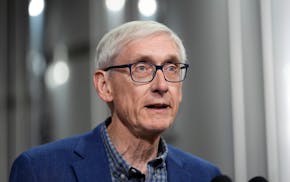One of Minnesota's legendary business success stories underwent a major revision Thursday at the criminal trial of businessman Robert Walker.
Walker, the founder of Select Comfort Corp. in the late 1980s, is accused of cheating investors in an energy company he ran from 2001 to 2011. Along the way, Walker touted to potential investors in the now-defunct Bixby Energy Systems his executive credentials at the Minnesota-based bed company.
But a retired investment banker testified in U.S. District Court in St. Paul that Walker brought Select Comfort close to bankruptcy by 1991, and was forced to step down as CEO as a condition for new investment.
"It was losing money and it had a negative cash flow," said Patrick Hopf, a retired executive of St. Paul Venture Capital, the first of five investment firms to pump $45 million into Select Comfort and bring in new executives and fresh strategy.
Hopf credited Walker with inventing the patented adjustable mattress. Indeed, Hopf said he bought one before investing in the company and within two weeks it had reduced his long-standing back pain. But he said the product's now-famous name, the Sleep Number bed, came several years after Walker stepped down as a company executive.
Walker, 71, is on trial for fraud, conspiracy, tax evasion and witness tampering. Prosecutors contend that he defrauded 1,800 investors who put $57 million into Bixby Energy, a company he cofounded in 2001. He is accused of lying to investors to enrich himself, his family and accomplices, including a convicted fraudster who has pleaded guilty in the fraud case.
News reports from the early 1990s about executive changes at Select Comfort didn't mention the reasons for Walker's departure. At the time, the company was privately owned, and not obligated to say anything publicly.
Prosecutors called Hopf to the witness stand, and may call another Select Comfort executive, to debunk Walker's claims of executive savvy. Hopf said Walker's removal as Select Comfort CEO in 1991 was a condition of his firm's investing the first $1 million in the bedmaker. Within two years, Walker was out as head of bed research, but retained a substantial ownership stake.
As Select Comfort grew in the succeeding years, eventually offering stock to the public in 1998, "Walker had nothing to do with the business strategy," Hopf said. That strategy initially focused on selling adjustable beds directly to customers through advertising and toll-free numbers. Later the company opened its own stores.
St. Paul Venture Capital invested about $20 million in Select Comfort, and sold its stake in the early 2000s for about $200 million, Hopf said.
Several investors have testified that Walker's claim to have turned Select Comfort into a successful publicly traded company was a major factor in their decisions to invest in Bixby. The now-defunct Ramsey company originally made corn-burning stoves, then shifted to clean-coal technology that prosecutors say was never fully developed and failed in its first commercial installations.
Felony evidence allowed
In a small victory for prosecutors, Judge Susan Richard Nelson ruled that they can ask witnesses whether they knew that two of Bixby's top executives had felony records. Investors who testified so far have said they initially didn't know of the felons at Bixby.
In arguing to allow jurors to hear such evidence, Assistant U.S. Attorney David MacLaughlin said of Bixby and Walker: "It was a schlocky fly-by-night company, and it was not the company he was telling people it was."
One investor testified Thursday that Walker told him to lie about his finances to get around a federal law that should have barred the man from buying shares in Bixby. Mark Wokojance of Strongsville, Ohio, said in 2002 he got interested in Bixby, but he lacked the required level of income or net wealth to invest in risky ventures.
To buy Bixby shares, Wokojance had to check a box on the investment papers signifying he qualified as an investor. He said he called Walker and told him he didn't qualify, and Walker said: "I didn't hear you say that. Just check one of the boxes."
Wokojance bought $20,000 in shares, and lost it all.
David Shaffer • 612-673-7090
Twitter: @ShafferStrib
United Airlines reports $124 million loss in a quarter marred by grounding of some Boeing planes

